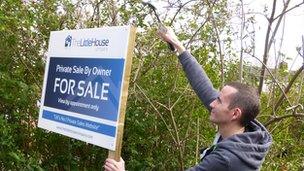Selling your own house: Could it save you a fortune?
- Published
- comments
The pros and cons of cutting out an estate agent
For thousands of people the start of spring means the beginning of the house-hunting season.
It is also time to ponder one of life's unanswered questions: How do estate agents have the cheek to charge a king's ransom for selling a house?
If that is your view, have you thought of trying to sell it yourself?
This year that should become easier, as the government is changing the rules , externalon selling houses over the internet.
Private sale websites that help you find a buyer for your property will be given new freedom to operate.
As a result, sellers could save thousands of pounds. But is it really a good idea, or could you end up wasting, rather than saving, money?
How does it work?
Selling your house DIY style means exactly that.
When you sign up with a private sale website, they will send you a "For Sale" sign with your phone number on it to erect outside your house.
Get used to the graft of banging the sign into the ground, because from now on the task is only going to get harder.
You take the photographs, you show potential buyers round the property, you organise Energy Performance Certificates (EPC's), and above all, you negotiate on price with any potential buyer.
In return for the website posting your photos, and matching you with buyers, you will pay anything from £300 to £600.
At the higher end of that price range, your property details will also be advertised on the big portals like Rightmove and Zoopla, which dominate the market.
Some sellers, like David Dexter, are ecstatic at the potential savings on offer.
"I think that an estate agent is a service that I can do. And I think it's a really great opportunity to get the house out to as many people as possible. And essentially, to save a lot of money," he explains.
He is selling a three-bedroom house near Reading in Berkshire for £265,000.
His local estate agent quoted a fee of around £4,800, including VAT.
But he has opted to pay £600 for a premium service with The Little House Company, one of many private sale websites.
If he manages to sell it, he will therefore save himself over £4,000.
Traditional agencies
Estate Agencies are having to defend their reputations like never before.

Estate agents include price negotiations in their charges
They point out that selling a house is only a small part of the service they offer.
"Selling the house is the easy bit," says Mark Hayward, of the National Association of Estate Agents.
"Much more difficult is dealing with the offer, checking the chain, and talking to lawyers," he says.
Many estate agents will try and establish whether potential buyers are who they say they are, and whether they can really afford to buy your house.
In particular they say price negotiation is a skill that many people think they have, but in reality do not.
Peter Bolton King, of the Royal Institution of Chartered Surveyors (RICS), says private sale websites offer a totally different level of service to that of an estate agent.
"There is a huge difference between paying a few hundred pounds just to put the property on to the internet, compared with all of the services that should be provided, and the security that should be offered, by the good traditional local estate agent," he told the BBC.
Estate agents are also members of the Property Ombudsman scheme, external, which provides for financial compensation should things go wrong.
Law Change
For anyone thinking of selling privately, the key question is how many houses have actually been sold through such websites.
Houseweb, which has been going for 17 years, claims to have sold 15,000 homes over that time.
But some of the other websites the BBC tried to contact were not so forthcoming with figures. One of the best known did not return our calls.
This may be because the current legal limitations prevent them operating effectively.
When the law that defines an estate agent is changed later this year, these private websites will be relieved of certain obligations placed on estate agents, like having to visit the property concerned.
The government hopes the greater freedom they then will enjoy will allow them to flourish, and the market to grow.
In the United States it is thought around 10% of house sales are carried out through private sale websites.
RICS estimates that the equivalent figure for the UK is currently around 5%, which suggests that de-regulation could make a significant difference.

DIY house selling includes erecting your own for sale sign
Advice
The danger for sellers is that they may pay several hundred pounds to a private sale website, but still fail to find a buyer. If they then resort to an estate agent, they will have spent more money, not less.
One alternative is to use an online estate agency instead. They tend to have a larger reach, and so attract a larger number of potential buyers.
Ask yourself whether anyone looking for property in your area is really going to be able to find it on the internet.
Maybe do a web search in the area, and see which property site comes up first.
Or consider a private sale alongside an estate agent sale.
But be careful to get the agreement right with the agent, in case you end up selling privately, but still paying the agent.
"If you get the contract right, if you're absolutely up front with both sides, you could advertise privately, but then you can also work through an estate agent as well," advises Kate Faulkner of the website Propertychecklists.
"But you need to get the contract absolutely watertight to make sure you don't end up paying both fees."
Even if most house-sellers fail to embrace the new websites, the forthcoming deregulation could still end up changing the market.
Some believe that estate agents may be forced to introduce fixed fees for their services, rather than taking an average 1.5% commission.
That could be particularly advantageous for those with larger properties, who historically have faced steeper bills from estate agents.